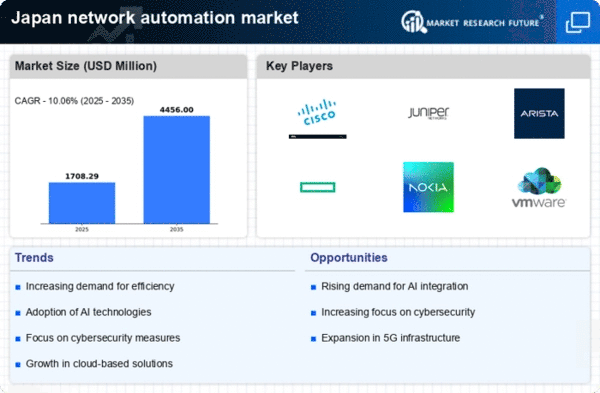Integration of IoT Technologies
The integration of Internet of Things (IoT) technologies significantly influences the network automation market in Japan. As IoT devices proliferate, the complexity of managing these devices within networks increases. Organizations are compelled to adopt automation solutions to ensure seamless connectivity and management of IoT devices. The market data indicates that the number of connected IoT devices in Japan is expected to reach 1 billion by 2025, necessitating robust network automation strategies. This trend highlights the critical role of automation in maintaining network performance and reliability, thereby driving growth in the network automation market.
Emphasis on Regulatory Compliance
The emphasis on regulatory compliance is increasingly shaping the network automation market in Japan. Organizations are under pressure to adhere to stringent regulations regarding data security and privacy. Automation solutions play a crucial role in ensuring compliance by providing consistent monitoring and reporting capabilities. The market data reveals that compliance-related costs can account for up to 15% of an organization's IT budget. By investing in network automation, companies can mitigate risks associated with non-compliance while optimizing their operational expenditures. This focus on regulatory adherence is likely to drive further growth in the network automation market.
Shift Towards Cloud-Based Solutions
The shift towards cloud-based solutions is a pivotal driver for the network automation market in Japan. As businesses migrate their operations to the cloud, the demand for automated network management tools rises. Cloud environments require dynamic and scalable network solutions to accommodate fluctuating workloads. Recent statistics suggest that over 70% of Japanese enterprises are adopting cloud services, which in turn fuels the need for effective network automation. This transition not only enhances flexibility but also reduces the time required for network provisioning and management, thereby propelling the network automation market forward.
Rising Demand for Operational Efficiency
The network automation market in Japan experiences a notable surge in demand for operational efficiency. Organizations are increasingly seeking to streamline their network operations, reduce manual interventions, and enhance overall productivity. This trend is driven by the need to manage complex network environments effectively. According to recent data, companies that implement network automation solutions report a reduction in operational costs by up to 30%. This efficiency not only lowers expenses but also allows IT teams to focus on strategic initiatives rather than routine tasks. As a result, the network automation market is poised for growth, with businesses recognizing the value of automated solutions in achieving their operational goals.
Growing Need for Enhanced Network Security
The growing need for enhanced network security is a significant driver of the network automation market in Japan. With the increasing frequency of cyber threats, organizations are prioritizing the implementation of automated security measures. Network automation solutions enable real-time threat detection and response, which is essential for safeguarding sensitive data. Recent reports indicate that cyberattacks in Japan have surged by over 40% in the past year, underscoring the urgency for robust security frameworks. Consequently, businesses are investing in network automation to bolster their security posture, thereby contributing to the expansion of the network automation market.
















